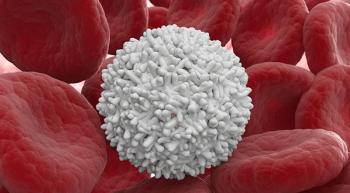
“We want to make sure we can provide the right treatment for the right patient at the right time,” says Olufunmilayo I. Olopade, MD, FACP, OON.

“We want to make sure we can provide the right treatment for the right patient at the right time,” says Olufunmilayo I. Olopade, MD, FACP, OON.

Several cancer organizations signed a group statement calling for health care employers to mandate COVID-19 vaccinations for their employees.

Each patient with breast cancer has a unique experience. Their survivorship care should reflect that.

PARP inhibitors and novel combinations targeting the androgen receptor will help define the future treatment paradigm for patients with metastatic castration-resistant prostate cancer.

Up to 50% of patients with B-cell malignancies will relapse on CAR T-cell therapy. Investigators are looking in to new ways to overcome that drug resistance.

An immunologist and oncologist, Merad has spent her career studying inflammation in patients with cancer and was at the right place at the right time to translate her expertise to examine inflammation in patients with COVID-19.

Maintaining sexual function is often low on the list of priorities for a woman recently diagnosed with a gynecologic cancer, but raising the subject early in her treatment course may make the patient more willing to engage in a discussion as her care progresses, according to Don S. Dizon, MD, who specializes in survivorship issues.

Ruxolitinib (Jakafi) induced a strong, durable response across several subgroups of patients with steroid-refractory acute graft-versus-host disease.

Treatment with talazoparib (Talzenna) did not demonstrate a statistically significant overall survival (OS) benefit in patients with BRCA1/2-mutated metastatic HER2-negative breast cancer, according to updated findings from the phase 3 EMBRACA trial (NCT01945775).1 However, lead author Jennifer Litton, MD, said that there is still reason to believe treatment with the PARP inhibitor can improve OS.

Waun Ki Hong, MD, a pioneering medical oncologist recognized for his practice-changing research in head and neck cancer, died at his home in California on January 2.

Rapid changes in the treatment landscape for melanoma have prompted the Society for Immunotherapy of Cancer (SITC) to issue updated consensus guidelines to help clinicians stratify patients, choose optimal treatment regimens, and manage immune-related adverse events (irAEs) in patients with stage II to IV disease.

Immunotherapy pioneers James P. Allison, PhD, and Tasuku Honjo, MD, PhD, have won the 2018 Nobel Prize in Physiology or Medicine for their research that eventually led to the use of immune checkpoint inhibitors to treat cancer.

Safety and efficacy findings for regorafenib (Stivarga) in patients with previously treated metastatic colorectal cancer (mCRC) were consistent with previous phase III results, according to findings from the phase IIIb CONSIGN trial.

Patients with multiple myeloma who are older than 75 years could be viable candidates for autologous stem cell transplantation (ASCT).

Banu K. Arun, MD, discussed the challenge of treating patients with triple-negative breast cancer, the value of genotyping, and what she hopes to see in future trial results.

New guidelines issued by the US Preventive Services Task Force (USPSTF) recommend for women aged 30 to 65 years at average risk for cervical cancer to choose to receive a Pap smear alone every 3 years, screening with the high-risk human papillomavirus test alone, or cotesting every 5 years.

Enfortumab vedotin, an antibody-drug conjugate, showed promise as a post-immunotherapy treatment of patients with locally advanced or metastatic urothelial cancer, according to Jonathan E. Rosenberg, MD.

Late effects from treatment of central nervous system (CNS) tumors, such as cognitive impairment and physical performance, may hinder full functional and social independence among adult survivors, according to findings published in the Journal of Clinical Oncology.

The FDA has approved the Magtrace and Sentimag Magnetic Localization System to identify and remove sentinel lymph nodes in women undergoing mastectomy for breast cancer.

Sunitinib (monotherapy appeared noninferior to cytoreductive nephrectomy and adjuvant sunitinib, the current standard of care for patients with synchronous metastatic renal cell carcinoma, according to results from a phase III study presented at the 2018 ASCO Annual Meeting.

Researchers at the National Institutes of Health are exploring whether CAR T-cell therapy can enhance the effectiveness of treatment with hematopoietic cell transplant (HCT) among patients with relapsed/refractory acute lymphoblastic leukemia (ALL).

President Donald Trump's recently announced “blueprint” to lower the prices of prescription drugs in the United States drew cautious responses from oncology groups and patient advocates.

A shortage of genetic counselors inspired researchers to find a way to streamline testing to prevent delays in treatment for patients with ovarian cancer who require BRCA testing.

The FDA has granted a priority review to moxetumomab pasudotox for the treatment of adult patients with hairy cell leukemia (HCL) who have received at least 2 prior lines of therapy, according to AstraZeneca (MedImmune), the developer of the anti-CD22 recombinant immunotoxin.

Patients with stage III colon cancer who ate at least 2 servings of nuts per week had superior disease-free survival (DFS) and overall survival (OS), according to results from the CALGB 8903 study published in the Journal of Clinical Oncology.

New research indicates that both a dependence on glycolysis and prior chemotherapy appear to reduce the potential for T cells to develop into chimeric antigen receptor (CAR) T-cell therapy.

A filgrastim (Neupogen) biosimilar, EP2006, recently produced safety results equivalent to those observed with referent filgrastim in a combined analysis of 2 phase III breast cancer studies from the United States and Europe.

The National Comprehensive Cancer Network (NCCN) has added the combination of TTFields (Optune) and temozolomide (Temodar) to its Clinical Practice Guidelines in Oncology for Central Nervous System Cancers for Category 1 treatment of newly diagnosed glioblastoma multiforme following maximal safe resection and completion of radiation therapy.

Survivors of childhood cancer often suffer from long-term physical and cognitive impairments that could affect their ability to secure or keep a job.

The FDA has granted a priority review to a supplemental new drug application for enzalutamide (Xtandi) for the treatment of men with nonmetastatic castration-resistant prostate cancer (CRPC).